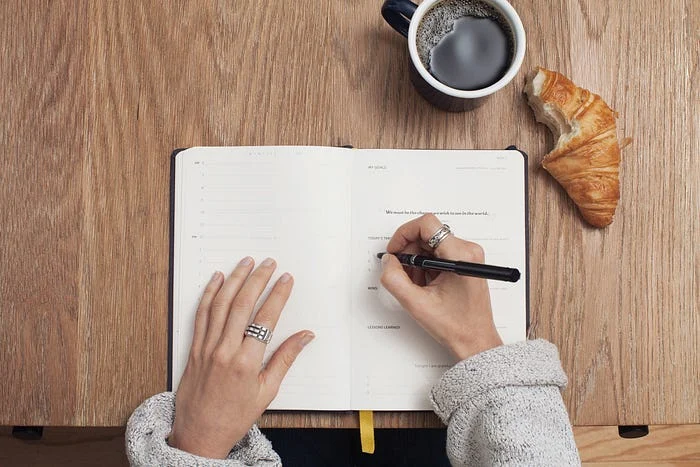5 Strategies To Help Clear Your Creative Brain Fog
5 Strategies To Help Clear Your Creative Brain Fog
5 min read

Fakurian Design / Unsplash
Ever feel stuck, confused, or forgetful? Like you just can’t focus or concentrate on even the smallest tasks anymore? That’s brain fog. Although not an official medical term yet, it is occurring more often as we collectively suffer through this pandemic alongside our other daily stresses.
For me, it’s related to complicated grief and loss in my family. For you, it may be a similar reason — or it could be financial stress, relationship issues, or your own mental health struggles.
It’s important to note that brain fog can also be a sign of a mental or physical issue beyond daily stressors, so please talk with your physician to discuss if it is affecting you more frequently as time passes.
I’ve come across 5 ways that have helped me clear my own creative brain fog and can help you remove cluttered thoughts and rekindle that creative spark.
Strategic Journaling

Cathryn Lavery / Unsplash
I know. It seems like the first suggestion on every article about how to help with mental blocks….but it’s for good reason. The issue I’ve had with journaling in the past was the lack of strategy behind it. My ability to write things down isn’t the issue. It’s getting through specific blocks that are bogging down my mind and making me overthink everything I write.
Here are three things I do to help organize and start my day with less stress:
Write down what you’re thinking right now (i.e., stressors, fears, anxieties). Use this to identify your mental block. Identifying it is the first step to preventing that mental loop from continuing throughout the day.
Write down what you need to do today. Keep it to three simple tasks that are possible to get done today. Use this to make tangible actionable steps towards attainable goals for that day.
Write down what you want to have today (peace, organization, contentment, etc.). Use this as a mantra. Example: I want to have peace and clarity around me by organizing the clutter on my desk.
Doing this helps declutter your mind, be present, and make those daily To-Dos much less stressful to get done.
Intentional Silence

Christopher Sardegna / Unsplash
We’re inundated with noise and content and visuals just about every second of every day. Most of us genuinely enjoy our lo-fi beats while we work or putting the television on in the background to feel like there’s something happening around you. But have you asked yourself why you need the comfort of noise? Does it actually help you all the time? Or are you preventing your mind from listening to its own thoughts?
Now, some may be thinking this is the same as meditation, but they aren’t exactly the same. Meditation often has you fixating on one mantra or trying to make your mind still, while silence is trying not to focus on anything in particular and to try to truly relax.
Whether it be 5 minutes, 30 minutes, or 1 hour, making time to be in silence intentionally is amazing for your mental and physical health. Buying noise-cancelling headphones are amazing and can go with you anywhere you may need some quiet time.
Unlearning Thought Habits

Riccardo Annandale / Unsplash
We all grow up with an expected set of norms that trains us to think and act on collective behaviors. Though some are healthy in relating to one another, there are quite a few can stunt creativity, halt progress, and stall personal and professional growth in our lives. Unlearning harmful mental habits can help stop that creative block from growing into an entire wall.
Think back to a time when you didn’t have to think too hard before starting something new. We typically don’t have hesitation or fear until we experience something that makes us hold onto it.
Write down specific mantras and reiterate them to create thought habits when you feel yourself overthinking or your mind feels a bit cluttered to help you redirect those fears and hesitations.
Find Comfort

Inside Weather / Unsplash
We all know we should “get out of our comfort zone” to improve ourselves sometimes. But making time for comfort is equally important. Listen to your mind and body when you need rest. Comfort is there to help restore those internal batteries to then give that passion project or that next step in your work process the focus and initiative it deserves.
When you feel yourself seeking out comfort over productivity — like binging your favorite shows and movies when you have those important tasks to do or deciding to organize your closet when you’re supposed to finish writing that blog post (no judgement here!) — then it’s often because your mind is tired or overworked. You need to listen to those moments to slow down.
Here is a great post by the Sensitive Evolution blog (link) discussing how being uncomfortable is not necessarily better than being comfortable and ways we can reframe our comfort zones to work in context with our circumstances.
Digital Detox

Pier Monzon / Unsplash
Turning off and unplugging your devices can actually help reduce that underlining static white noise our subconscious can pick up in the background. This simple action can go alongside the intentional silence habit to bring immense clarity and focus when you need it and reduce stress daily. Here’s a link to an article by Very Well Health highlighting studies about the effects heavy device usage can have on our mental health.
From my experience, just the act of unplugging and turning devices off can help reduce feelings of overwhelm by reducing the amount of content I feel compelled to watch when I’m stressed. This can be extremely helpful if you let loved ones know you have a designated time to unplug, turn off, and be present in your day.
So, those were five practical ways to clear out creative brain fog. Remember, you don’t have to do them all at the same time and you may find you only need one. I encourage you to try it and see how you feel after just one week. You may find even better ways that work for you.
Have you tried any of these strategies before? Feel free to share any tips or practices you’ve found helpful in your mental health journey.
Like this project
Posted Aug 13, 2025
If you've ever felt stuck, confused, or forgetful, here are the five most effective strategies to clear creative brain fog published on Medium.
Likes
0
Views
21
Timeline
Sep 15, 2021 - Sep 15, 2021







